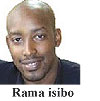There is a saying that nothing in life is wasted if we can learn from it, 1 million lives is a high price to pay for a lesson in life. The lessons and legacy of the 1994 Genocide against Tutsi have yet to be fully grasped mainly because the perpetrators and their apologists dispute the basic facts.


There is a saying that nothing in life is wasted if we can learn from it, 1 million lives is a high price to pay for a lesson in life. The lessons and legacy of the 1994 Genocide against Tutsi have yet to be fully grasped mainly because the perpetrators and their apologists dispute the basic facts.
For the apologists who mitigate, explain, justify, redefine, and deny what is basic fact, I wonder what motivates them. I used to think it was guilt or shame but I now think it is that they do not want to change their view of the world, because to end Genocide as a concept we have to change our basic view of humanity.
Many outsiders I debate with say "I see both sides.” If you do then you believe in wrong and right at the same time.
Then a chorus of objectors, the gang of four, Human Rights Watch, and a bevy of publications saying "if ethnicity is not allowed back in politics then it will lead to another genocide.”
It was because ethnicity was allowed in politics that genocide happened, as if to tell a happy man to commit suicide to avoid the distant possibility of murder.
Almost all the measures called for by critics of the status quo would hasten another murder spree.
In order to understand the lessons of the Genocide we must understand why it happened, we cannot look at the results.
One must read a book called "Collapse: Why Civilizations Choose to Fail!” by Jared Diamond, he looks at the collapses of various societies from all over the world fade, he has a chapter on Rwanda .
He is an environmental and social scientist, so he looked at soil samples which were degrading over time, rains were failing, diets were changing to heavy starches, cultural and social breakdown. 1994 was the apocalyptic end of a civilisation, the perpetrators never thought there would be a Rwanda to speak of.
Diamond always mitigates but is clear that a choice was made to fail, to implode, to kill, and that is what we must learn.
So what lesson do we learn? That killing people because of their ethnicity is wrong?
We already knew that, what we must learn to spot the signs and symptoms of the disease. We should never let things escalate when we see the signs and finally prosecute those responsible.
That is how you end genocide as a concept, with a mere frown, at the first sight of something untoward you must frown and caution the offender, to nip it in the bud. There are ethnic enmities all over the world, with depleting resources, there will be a gradual increase in conflicts, these conflicts will have different protagonists, racial profiles but the dynamics will be the same.
We have tolerated Genocides because we have tolerated hate speech, unaccountability, ethnic manipulation and when the cycle is over we deny it happened and refuse the lessons. We will have to treat genocide like you treat a disease, when we call it a Genocide against Tutsi we are acknowledging where the cancer attacked.
If a man dies of cancer that started in his pancreas and spread to his lungs, it is pancreatic cancer that killed him, not cancer in general. To fight the disease we have to identify its original target. So this disease will have to be inoculated with education, and those infected will have to be quarantined, treated and re-released when they no longer pose a threat.
Otherwise they would now be saying "Remember that country they used to call Rwanda ? They just couldn’t get along.”


